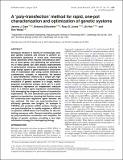A ‘poly-transfection’ method for rapid, one-pot characterization and optimization of genetic systems
Author(s)
Gam, Jeremy J.; DiAndreth, Breanna; Jones, Ross D.; Huh, Jin; Weiss, Ron
DownloadPublished version (3.610Mb)
Publisher with Creative Commons License
Publisher with Creative Commons License
Creative Commons Attribution
Terms of use
Metadata
Show full item recordAbstract
Biological research is relying on increasingly complex genetic systems and circuits to perform sophisticated operations in living cells. Performing these operations often requires simultaneous delivery of many genes, and optimizing the stoichiometry of these genes can yield drastic improvements in performance. However, sufficiently sampling the large design space of gene expression stoichiometries in mammalian cells using current methods is cumbersome, complex, or expensive. We present a 'poly-transfection' method as a simple yet high-throughput alternative that enables comprehensive evaluation of genetic systems in a single, readily-prepared transfection sample. Each cell in a poly-transfection represents an independent measurement at a distinct gene expression stoichiometry, fully leveraging the single-cell nature of transfection experiments. We first benchmark poly-transfection against co-transfection, showing that titration curves for commonly-used regulators agree between the two methods. We then use poly-transfections to efficiently generate new insights, for example in CRISPRa and synthetic miRNA systems. Finally, we use poly-transfection to rapidly engineer a difficult-to-optimize miRNA-based cell classifier for discriminating cancerous cells. One-pot evaluation enabled by poly-transfection accelerates and simplifies the design of genetic systems, providing a new high-information strategy for interrogating biology. ©2019
Date issued
2019-08Department
Massachusetts Institute of Technology. Department of Biological EngineeringJournal
Nucleic acids research
Publisher
Oxford University Press (OUP)
Citation
Gam, Jeremy J., et al., "A ‘poly-transfection’ method for rapid, one-pot characterization and optimization of genetic systems." Nucleic acids research 47, 18 (August 2019): p. e106 doi 10.1093/NAR/GKZ623 ©2019 Author(s)
Version: Final published version
ISSN
1362-4962
0305-1048